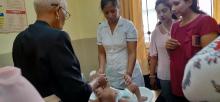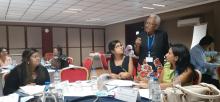Empowering Health Workers on Child Growth Assessment
Nutritionists, Public Health Nursing Officers, Nursing Officers, Chief and Principal Midwives and Health Care Assistants in the Republic of Mauritius have been empowered during a Training of Facilitators on child growth assessment and WHO Child Growth Standard from 10-13 February 2020 at Gold Crest, Quatre Bornes.
The main objective of the training was to empower health workers on growth assessment using additional indicators, data analysis and reporting of anthropometric data in the context of strengthening the National Nutrition Surveillance System in Mauritius and Rodrigues. This important capacity building workshop was conducted by the Ministry of Health and Wellness in collaboration with the World Health Organization in response to the need to have a holistic information system that can continuously collect, analyze and interpret data related to nutrition. Dr Hana Bekele, Nutrition Advisor from the WHO Regional Office for Africa/Intercountry Support Team for East and Southern Africa (IST/ESA), facilitated the training.
It is to be recalled that during the 6th Meeting of Ministers of Health of the Small Island Developing States (SIDS) in 2017, Dr Moeti, WHO Regional Director, stated her commitment in supporting Mauritius and Seychelles in strengthening the National Nutrition Information System (NIS) regarding children of zero to five years.
In October 2018, WHO in collaboration with the Ministry of Health and Wellness conducted a Scoping Mission whereby the strengthens and weaknesses of the present NIS were identified through a desk review. The key findings of the review showed that the country collects data, scattered within different programs with a limited scope of nutrition database system that compiles all such data. Moreover, there are several paper-based data collection tools including the Child’s Growth card, Patient’s card and maternal health data collection tools in use. However, the data collected is not effectively analyzed.
It was also found that there is provision for all children under the age of 5 years to be assessed and their measurements are monitored and plotted on their growth charts. However, there is a lack of consistency in the growth monitoring system and the data collected among children aged three and above who are attending pre-primary school is not structured.
Two main recommendations came out of the Scoping Mission; firstly, to include the indicators worked out by the Nutrition team and WHO Nutrition Advisor in the Nutrition Information System and secondly, to train health professionals involved in data collection in child growth assessment.
During the intensive four-day training of facilitators, the participants gained the necessary knowledge and skills regarding the right techniques to be used to assess child growth. The training consisted more of self-learning and practical exercises, including a practical session at the Club Road Area Health Centre in Vacoas on the second day. It was critical for health professionals working on child growth assessment to be trained in order to improve the quality of data collected. All participants who attended the training course were awarded a Certificate of Participation.
Dr Ismael Nawoor, the Acting Director Health Services of the Ministry of Health and Wellness, addressed the participants at the closing ceremony. He expressed the concern of the Ministry of Health and Wellness regarding low birth weight and teenager pregnancy in the country. The Director Health Services, himself an experienced Gynecologist, stated that it is crucial to understand the causes of low birth weight to address the problem accordingly.
“Strengthening the National Nutrition Surveillance System in Mauritius is very important as it will provide indicators that will help determining the health status of individuals throughout life course’, emphasized Dr I. Nawoor.
Dr Laurent Musango, WHO Representative in Mauritius, during his speech, highlighted the importance of building capacity in child growth assessment to track problems related to child obesity. He added, “Mauritius has a high prevalence of Noncommunicable Diseases and risk factors including unhealthy diets and obesity. It is thus very important to start as early as possible to address the problem of obesity among children.”
A roadmap, which takes into consideration the recommendations from the Training workshop, was elaborated by the Nutrition team and WHO. The next steps now will be to review and update the existing Health Cards to include the Growth Charts with Z scores for stunting, wasting and underweight; review and update the data collection tools; procurement of the Anthropometric equipment and the holding of the Orientation Workshop for all health workers involved in child growth assessment. The electronic data base system will also be reviewed in order to capture the necessary indicators. With the establishment of a proper Nutrition Information system and availability of appropriate data and information, health professionals will be in a better position to counsel mothers on optimum child feeding practices.
Dr L. Musango reiterated the commitment of the Organization at the three levels, namely country, regional and global in supporting Mauritius in its efforts in moving forward to strengthen the National Nutrition Surveillance System and to support the implementation of the roadmap.





